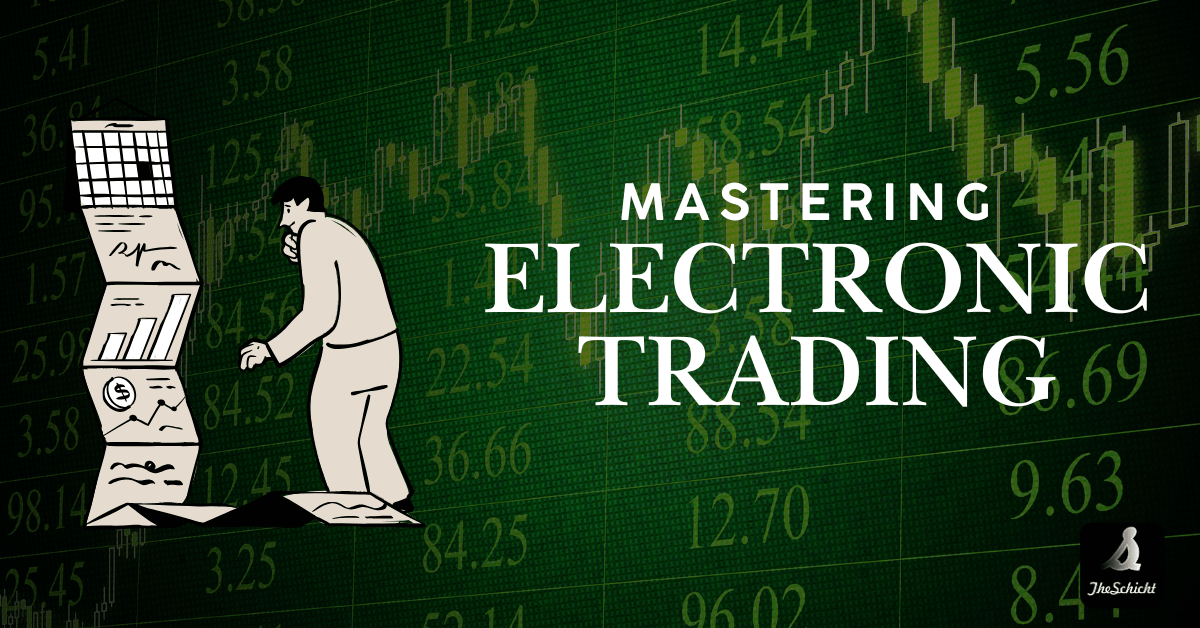Introduction to Electronic Trading

Electronic trading involves the buying and selling of financial instruments online through electronic trading platforms. These platforms have transformed how global financial markets operate, enabling the trading of a wide range of financial products such as stocks, bonds, commodities, and foreign currencies. Robo-advisors and algorithms assist in executing trading strategies in electronic trading, enhancing efficiency and precision.
The rise of electronic trading has dramatically increased trading volumes (with daily trading volume in the foreign exchange market reaching as high as US$7.5 trillion) and broadened access to financial markets. Advanced trading systems, artificial intelligence systems, and powerful computer technologies are central to the execution of electronic trading activities, with computer systems serving as the backbone of electronic trading infrastructure by facilitating real-time transaction execution, order management, and regulatory compliance. A computerized matching engine handles a high volume of transactions during market hours, ensuring seamless operations. These systems offer speed, transparency, and efficiency. Electronic trading also reduces costs compared to traditional methods by increasing automation and lowering transaction expenses, including lower spreads, commissions, and other transaction fees, which enhances transparency and overall profitability for clients and businesses.
Choosing a Trading Strategy
A solid trading strategy or set of trading strategies is crucial for success in electronic trading whether trading in the foreign exchange or stocks.
Choosing the right trading platform and brokerage firm forms the foundation of a successful approach.
There are various trading strategies to explore—such as day trading, swing trading, and scalping—each with different risk levels and time commitments.
An experienced trader may craft custom strategies based on market conditions, technical analysis, and macroeconomic factors like inflation or build his own trading strategy on on top of existing ones by combining multiple trading strategies.
In the U.S., trading activities such as futures and options fall under the regulation of the Commodity Futures Trading Commission (CFTC), ensuring market integrity and investor protection. Trading systems must also provide records of transactions to regulatory agencies such as the exchange commission, ensuring compliance and transparency in trading activities. Transaction records are stored for client statements and regulatory compliance, further enhancing accountability.
Trading Platforms
Trading platforms offer direct access to global financial markets, including stock exchanges and forex markets. These platforms connect traders to various trading venues, which are locations where securities are bought and sold.
Brokerage firms typically provide their clients with access to proprietary or third-party platforms, each equipped with unique tools, features, and functionalities. Brokers act as intermediaries, facilitating trades on these platforms and connecting buyers and sellers. Investors should consider features such as fees and commissions when choosing a broker, as these can significantly impact overall trading costs.
The efficiency of these platforms allows traders to execute transactions instantly, monitor markets in real time, and employ automated strategies. The ideal platform for a trader depends on their trading style, experience level, and specific goals.
Brokerage Accounts and Firms
To begin trading, a brokerage account must be opened through a brokerage firm. After opening the account, you will typically need to link a bank account to fund your brokerage account and enable seamless transfers for deposits and withdrawals. Opening a brokerage account is a foundational step for investing, as it enables individuals to participate in the buying and selling of securities and other financial instruments.
These firms act as intermediaries between buyers and sellers, managing client accounts and facilitating orders.
Behind the scenes, organizations like the Depository Trust Company (DTC) handle the clearing and settlement of trades, ensuring a smooth and secure transaction process. A broker-dealer processes and executes stock orders, transferring trade information to exchanges or OTC networks and updating client accounts accordingly.
Brokerage firms may offer different types of accounts, such as margin accounts (which allow borrowing to trade) and cash accounts (where trading is limited to available funds). Different brokers offer various types of accounts with differing features and fees, allowing investors to choose options that align with their trading needs and financial goals.
Brokers charge commissions or fees for executing transactions on behalf of clients.
Financial Instruments
Securities trading is the process of buying and selling financial instruments such as shares, bonds, and currencies through stock exchanges, electronic platforms, or over-the-counter markets. With the evolution of electronic systems, securities trading now allows broad market participation and increased automation.
Financial instruments traded electronically include:
-
Stocks (Equities): Ownership shares in companies; equities represent a claim on a company’s assets and earnings
-
Securities: A security is a debt or equity instrument with financial value that can be traded on electronic platforms
-
Commodities: Physical goods like gold, oil, or agricultural products
-
Currencies: Units of national economies traded in the foreign exchange market
Other financial instruments, such as derivatives or cryptocurrencies, can also be traded electronically.
Each instrument has its own market dynamics and risk profile, and investment is a primary reason for trading these instruments. Market makers and broker-dealers play a vital role in maintaining liquidity and ensuring smooth trading activities.
Market Participants
Electronic trading markets are composed of various participants, including:
-
Retail Traders: Individual investors trading on their own
-
Institutional Investors: Entities like mutual funds, hedge funds, and pension funds
-
Market Makers: Firms that provide liquidity by quoting buy and sell prices
-
Government Institutions: Central banks and regulatory bodies that influence economic policies
Other market participants, such as multinational corporations and commercial companies, also play a significant role in the market by engaging in currency trading and influencing exchange rates.
Cross-border trading and international investments are common, with business activities and financial institutions actively participating in these markets. Electronic trading supports international trade by enabling efficient currency conversions and facilitating global transactions, allowing companies to import, export, and conduct financial operations across borders. Market conditions are often shaped by global participants and macroeconomic events.
Foreign Exchange

Forex trading involves the exchange of foreign currencies for profit. The forex market is the largest and most liquid market globally, operating 24/5 with trillions in daily volume. The foreign exchange market determines foreign exchange rates for every currency, playing a critical role in global financial systems. Money plays a fundamental role in forex trading, as participants exchange, transfer, and manage funds across different currencies and platforms.
Currency prices are influenced by a range of factors, including interest rates, the overall economy, geopolitical stability, and economic data. Central banks, such as the Federal Reserve, also play a significant role in currency markets by influencing monetary policy and exchange rates. Traders in this space must manage risks such as exchange rate volatility and liquidity fluctuations.
Stock Trading
Stock trading involves buying and selling shares of publicly listed companies on the stock market. Investors can purchase shares as part of their investment activity, while companies use the stock market to raise capital for expansion. In every transaction, there is a buyer and a seller, with ownership of shares transferring from the seller to the buyer.
Stock prices are driven by company performance, investor sentiment, economic reports, and market trends. Investors may sell shares to realize profits or adjust their portfolios. Brokers play a key role in executing trades, aiming to provide the best price for both buyers and sellers. While potentially profitable, stock trading carries risks like market volatility and liquidity concerns.
Forex Trading
Forex trading, while similar to foreign exchange, usually refers to speculative trading in currency pairs (e.g., EUR/USD, USD/JPY). It’s a decentralized, global market with high leverage potential—making both gains and losses substantial. Currencies are traded against one another in currency pairs, which form the basis of all forex transactions.
Unlike foreign exchange a deep understanding of chart patterns, technical analysis, macroeconomic indicators, and trading strategies is essential for forex traders to succeed.
Risk Management

Effective risk management is at the heart of every successful trading strategy. This includes identifying potential risks, setting stop-loss and limit orders, and diversifying trading assets. It is important to note that certain trading activities, such as options trading, involve significant risk and may not be suitable for all investors.
Tactics such as hedging and using position sizing help traders minimize losses during unfavorable market movements. A disciplined approach to monitoring and adjusting trades is key to long-term profitability.
Market Analysis
Informed decisions are based on robust market analysis, which includes:
-
Technical Analysis: Studying price charts, patterns, and indicators
-
Fundamental Analysis: Evaluating economic indicators, earnings reports, and company health
-
Sentiment Analysis: Gauging investor emotions and market sentiment
For example, technical analysis can help traders identify potential entry or exit points by analyzing chart patterns and historical price movements.
News, economic reports, and geopolitical events often cause significant price movements—making continuous analysis essential.
Trading Psychology
Mastering the emotional side of trading is just as important as technical skill.
Fear and greed often lead to poor decisions—cutting profits short or letting losses run.
Successful traders cultivate patience, discipline, and emotional control.
Having a well-defined trading plan—and sticking to it—is crucial to maintain objectivity and consistency.
Technical Indicators
Technical indicators assist traders in interpreting market trends and potential entry or exit points.
Popular indicators include:
-
Moving Averages (MA): Smooth out price data to identify trends
-
Relative Strength Index (RSI): Measures momentum and overbought/oversold conditions
-
MACD, Bollinger Bands, Stochastic Oscillator, and others
These tools are most effective when combined and used alongside broader analysis.
Fundamental Analysis
Fundamental analysis examines a company’s financial health and macroeconomic environment to determine its intrinsic value.
This includes reviewing:
-
Financial statements (balance sheet, income statement)
-
Management performance
-
Industry conditions
-
Broader economic data (GDP growth, inflation, interest rates)
This method is especially important for long-term investors.
Trading Discipline
Discipline separates successful traders from unsuccessful ones.
It means sticking to your trading plan, avoiding emotional decisions, and respecting your risk limits.
A good trading plan outlines clear entry and exit strategies, risk parameters, and profit targets.
Remaining consistent—even when markets are volatile—ensures long-term success.
Common Trading Mistakes
Even experienced traders can fall into traps such as:
-
Overtrading: Taking excessive trades, often due to impatience
-
Undertrading: Hesitating to act due to fear or uncertainty
-
Lack of adaptability: Failing to adjust to market shifts
-
Ignoring risk management: Leading to outsized losses
Learning from mistakes and remaining disciplined helps traders refine their approach.
Staying Up-to-Date with Market News
Success in electronic trading requires staying informed.
Regularly follow:
-
Market news and updates
-
Economic indicators and central bank announcements
-
Company earnings and geopolitical events
Real-time news feeds and alerts can help traders anticipate market movements and adapt strategies accordingly.
Conclusion
Mastering electronic trading demands a blend of technical knowledge, strategic planning, market analysis, and emotional discipline.
Trading platforms and brokerage firms offer the tools—but it’s up to the trader to apply them effectively.
Risk management, consistent learning, and adaptability are the cornerstones of long-term success in the digital trading arena. With dedication and the right mindset, anyone can navigate and thrive in the fast-paced world of electronic trading. However, electronic trading is not without risks, including technological glitches and fraud, which require vigilance and robust security measures.
FAQs
1. What do you mean by electronic trading?
Electronic trading refers to the use of computerized systems , AI systems or online platforms to buy and sell financial instruments like stocks, bonds, commodities, and foreign currencies.
2. What are the benefits of electronic trading?
-
Real-time execution
-
Lower transaction costs
-
Increased market access
-
Transparency and efficiency
-
Automated strategy implementation
-
Fast access to foreign exchange
3. What are the most common trading strategies?
-
Day Trading – Short-term trades within the same day
-
Swing Trading – Holding positions for several days
-
Scalping – Quick, small-profit trades throughout the day
-
Custom Strategies – Based on technical or macroeconomic analysis
4. What should I consider when choosing a trading platform?
-
Ease of use
-
Execution speed
-
Charting and analysis tools
-
Compatibility with your trading strategy
-
Cost and fees
5. Do I need a brokerage account to trade electronically?
Yes. A brokerage account is required to access electronic trading platforms and participate in buying or selling financial instruments.
6. What types of accounts do brokerage firms offer?
-
Cash Accounts – Trade using only available funds
-
Margin Accounts – Borrow money to increase buying power








Leave a Reply